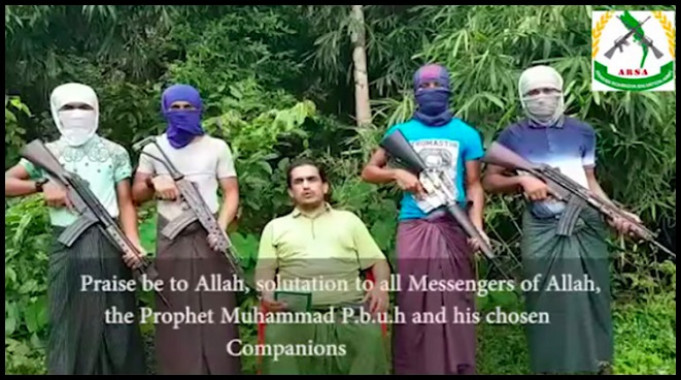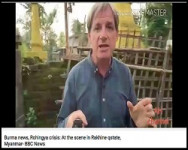Rebutting an under-informed critic
An ARSA video
Muhammed Sabith's "Is the Western Media really biased towards Rohingyas" ( DEC 3) is an attempted defence of the indefensible.
He carefully avoids the most important point I raised -- why is the ARSA killing other Rohingyas, those involved in mobilising the community for the National Verification Cards or for simply opposing the jihadi extremism of the ARSA.
How can one oppose the NVC exercise and then expect Rohingyas to regain citizenship! Just saying that this exercise is questionable is only feeding into the ARSA line.
Fifty-five Rohingyas have so far been killed by ARSA -- more than Burmese security personnel they have killed so far -- since Oct 10 when the ARSA launched its first serial attacks in Rakhine.
This is precisely what Pakistan-trained groups like Jaish and Lashkar do in Kashmir - any moderate who could initiate a peace process is neutralised ruthlessly. Hence the comparison. Groups seperated by huge distance behave and operate in similar ways if they are trained and indoctrinated by one organisation -- in this case the ISI. And the ARSA and its predecessor the HUJI-Arakan, whose founder Abdul Quddus Burmi or Chota Burmi was later killed in Jammu in an encounter with Indian forces. The nexus between ISI, its front LET and Jaish and Bangladesh's JMB and now ARSA is well established.
I need no certificate from Sabith about my credentials -- I have been a BBC journalist for 17 years and done scores of stories of Rohingya persecution over the years . A few examples :
1. http://news.bbc.co.uk/2/hi/south_asia/7830710.stm
2. http://news.bbc.co.uk/2/hi/south_asia/7830710.stm
3. http://news.bbc.co.uk/2/hi/south_asia/7839703.stm
I severely critiqued the Indian policy on Rohingyas when junior Home Minister Kiren Rijiju threatened to deport those of them already in India.
http://www.bbc.com/news/world-asia-india-41144884
I still have very good contacts with the Rohingya armed groups like the Arakan Rohingya Nationalist Organisation and for Mr Sabith's kind information, I trained Rohingya journalists of the Kaladan News Agency as part of an effort to create the Burma News International. Proper journalists and not citizen journalists , who spread more unverified rumours than valid news inputs.
Sabith tries to play the defence lawyer when he says : " While the author argues that the ARSA is keen “to eliminate all rivals in their own ethnic space” and has made efforts “to eliminate all moderate Rohingyas capable of negotiating with the Myanmar government”, he did not provide any convincing evidence for these claims. "
It is for the ARSA to explain,. and not me, why they are killing the Rohingya moderates or those who are trying to mobilise the community for NVC -- to me it is clear they are doing it because they don’t want competitors in the ethnic space -- like the Tamil Tigers neutralised all their competing Tamil guerrilla groups in Sri Lanka.
The Rohingya moderates wanted the Suu Kyi government to take some initiative -- and they welcomed it when they saw Suu Kyi going against the army 's decision and set up Kofi Annan commission and then promise to implement its recommendations by setting up an inter-ministerial committee. The ARSA torpedoed all that . If the Rohingyas want back what they lost in the 1982 citizenship law, the only way forward for them is to back the Suu KYi government when it tries implemnenting the Kofi Annan recommendations. But that is precisely what the ARSA is trying to block because it wants no integration and would fight only for an Islamic Republic of Northern Rakhine, which would well be the West's outpost in a strategic area connecting South with South-east Asia . But more on that later.
ARSA and their patron would surely project all these recommendations as part of some diabolical government conspiracy -- but living in Myanmar for several months now, I am aware of the huge tussle between Suu Kyi and the generals. Despite huge pressure from the army, she has not allowed proclamation of a regional emergency in Rakhine. Larry Jagan, the BBC’s former Asia editor, even says that she cancelled the UN trip because she feared the Vice President would sign the Rakhine regional emergency proclamation in her absence, since the President was away for medical treatment to Singapore.
Now can Mr Sabith explain why the ARSA attacked 30 police stations within hours of Suu Kyi accepting the Kofi Annan report! It is the ARSA attacks that pushed Suu Kyi on the backfoot and helped the army take charge in Rakhine. The ARSA provided the Burmese army the raison d'etre for unleashing a counter-insurgency campaign that clearly crossed the limits.
I have severe objections to writers like Sabith using a broad brush technique to see the 'Myanmar authorities' as one single monolith. Serious Myanmar watchers like Bertil Lintner and Larry Jagan have detailed the fissures and the tensions within the government which is clearly a hybrid of multi-party democracy and strong military control ( like serving generals running Home, Defence and Border Affairs Ministries) .
I am no defender of the Burmese army and have been one of its most persistent critics. This same army killed eight to ten thousand of its own boys and girls to crush the 1988 democracy movement -- and killed tens of thousands of other ethnic minorities over the last fifty years to crush the ethnic armed movements. What I object to is the naive potrayal of the Rohingya crisis as an unique case of 'ethnic cleansing'.
I am amazed at Sabith's quoting a comparison of the ARSA violent campaign with the 1944 Jewish uprising at Auschwitz. This is the joke of the year.
Anyone who has covered conflicts or has knowledge of military matters will understand that a group capable of attacking thirty police stations and a military base within two hours has a command structure, possess considerable training in coordinating offensive operations by mobilising at least a few hundred armed irregulars if not a few thousands. That the attacks were carried out successfully without the Burmese army getting a wind of it points to the considerable preparations done to evade the Burmese intelligence screen. That this happened when a full division of the Burmese army ( 33 Light Infantry Division) was involved in counter-insurgency operations in Northern Rakhine points to a high level of planning.
That the ISI played a vital role in such planning has been sufficiently elaborated before -- details of the intercepts of communication between ISI Brigadier Ashfaq and ARSA military wing chief Hafiz Tohar on 23-24 August have already been provided in Mizzima and other regional media outlets. 'Kala Admi jane ke sath sath hamla suru hona chahiye" ( Attacks must start immediately after the Black Man leaves) was what Ashfaq told Tohar. (A reference to Kofi Annan.) This conversation was intercepted by the Indian NTFO (national tech facilities org).
The Jews at Auschwitz did not have that hotline with the Red Army or the Allies -- they fought the Nazis with sticks and stones , not with automatics and long swords (which are rarely used in Myanmar ) .
I am aware of BBC Producers Guidelines which stresses on double checks . I will reiterate that the BBC documentary I am talking did not even try to get the Yangon bureau to double check the claims made by the survivors of the massacres. The survivor tales always don’t add up -- the number of people they claim to have been killed and raped are often much in excess of the total population of the village.
Sabith makes a funny case -- why not Rohingya citizen reporters! Well, the BBC interviewed Rohingyas and they freely expressed their plight , so why do they need Rohingya reporters -- the BBC has done what they do. We have already seen many survivors changing versions -- they say one thing to BBC or CNN and scale things down when interviewed by Bangladesh TV channels . The Hindu survivors first alleged their kinsmen were killed by Rakhine vigilantes backed by Burmese army -- then changed their version and said they were killed by ARSA but were told to blame it on Rakhines by the Muslims ' who helped us cross the border'.
BBC trained us to question even the most valid of claims in conflict zones where truth is often the first casualty -- that , it seems, is no longer the case in the post-Gilligan era. If Sabith is not aware, Andrew Gilligan was the journalist who exploded the myth of WMD ( weapons of mass destruction) said to be in possession of Saddam Hussein. But BBC suffered enormously with some of its topshots having to step down -- and in subsequent years, there is a growing trend of pro-government journalists and producers being send to conflict zones who play the script of the British and other Western governments.
The full-throated Western support for the Rohingya cause is rooted in the larger geo-political play in the area. The Western media is just playing His Majesty's tune. Ridiculous posturing like the demand for snatching away the Nobel prize from Aung San Suu Kyi are being made. Why not take away the Nobel prize from Henry Kissinger or even Barack Obama who got it immediately after becoming President!
The US and other Western Powers may be looking to create a 'Kosovo' in Northern Rakhine to block China.
A brilliant two-part piece in www.orientalreview.org by Andrew Korybko says : " Washington wants to establish a military presence in the Bay of Bengal in order to control China’s pipelines through Myanmar (both of which go through the Rohingya-inhabited Rakhine State), but in order to get to that point, it first needs for the Rohingya to have their own autonomous or independent government there."
It is because neither Sheikh Hasina in Bangladesh nor Aung San Suu Kyi in Myanmar will allow any US military presence that an alternative is perhaps sought. Both are intensely patriotic and no stooge of the West.
https://orientalreview.org/2015/06/09/american-plan-for-a-south-asian-kosovo-in-rohingyaland-i/
https://orientalreview.org/2015/06/09/american-plan-for-a-south-asian-kosovo-in-rohingyaland-ii/
The Western tirade over Rakhine has less to do with its commitments for human rights or concern for refugee rehabilitation . It is rooted in the emerging geo-political manoeuvres that may shape the Asia we live in.
Subir Bhaumik, a veteran BBC correspondent and author of five books on regional issues, is now Consulting Editor with Myanmar's Mizzima Media Group.









